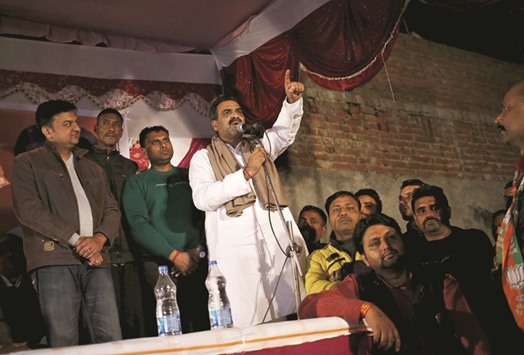A year before Uttar Pradesh holds assembly elections that could make or break Prime Minister Narendra Modi’s chances of a second term, political opponents, analysts and commentators say his Bharatiya Janata Party (BJP) is re-testing a divisive formula at a by-election in a troubled corner of India’s most populous state.
It was here in Muzaffarnagar, in 2013, that at least 65 people were killed in communal clashes between Hindus and Muslims. Around 12,000 people were driven from their homes in the surrounding villages where farmers grow sugarcane.
The following year, the BJP won 71 of 80 seats in Uttar Pradesh in a general election, handing Modi India’s biggest parliamentary majority in three decades.
Despite two major state poll defeats since, the BJP recently re-appointed Amit Shah as its campaign manager, counting on him to win again in the 2017 assembly vote. Shah, who holds the rank of party president, was banned by the Election Commission of India from campaigning in 2014 for statements promoting “hatred and ill will” between religions.
A senior aide to Shah said the Muzaffarnagar campaign raised legitimate issues to expose the flaws of the state government, led by the Samajwadi Party that is widely supported by Muslim voters. “It’s not illegal to voice the concerns of Hindus,” said the aide, who did not want to be named.
“To assume that we will only win elections by polarisation is ridiculous. Our work will prove a point and Modi’s image will work the best for us.”
At a BJP campaign rally in Muzaffarnagar, a town of 300,000 people, ahead of the by-election, a businessman chants a Hindu prayer and, to cheers, says girls should not fall for Muslim boys waging a “Love Jihad” against his community.
As a drunk party worker totters off the wobbly podium, he gets a pat on the back from Sanjeev Balyan, the federal minister of state for agriculture who was elected as the local MP in the 2014 landslide.
Balyan, 42, is being tried in a Muzaffarnagar court for rioting, disturbing the peace and unlawful assembly during the 2013 clashes, his lawyer said. He spent 12 days in prison before being granted bail. Further hearings are pending, and Balyan has pleaded his innocence.
Modi must win in Uttar Pradesh, India’s biggest electoral prize, to sustain his hope of one day gaining full control of parliament, where he lacks a majority in the upper house Rajya Sabha that represents the federal states.
A victory there would help the 65-year-old leader advance his development agenda by passing land, tax and labour reforms that have been thwarted by the opposition. Defeat could turn his government into a lame duck ahead of the 2019 general election.
With Modi’s promise of growth and jobs yet to materialise, the temptation to shore up his political base is growing, say political analysts.
“The party has nothing to boast about on the economic or development front,” said Sanjay Kumar, director of the Centre for the Study of Developing Societies, a New Delhi think-tank specialising in social sciences and opinion research. “If polarisation works, then they will be tempted to replicate it in the 2017 state elections.”
Party leaders say the BJP is determined to keep its base intact with a message of Hindutva, or the idea that India is a Hindu nation.
“Many people are taken aback by the directness of the BJP’s Hindutva messaging in the Muzaffarnagar by-election, but we are only speaking the truth,” Chandra Mohan, a BJP spokesman in state capital Lucknow, said.
“The BJP has mastered the art of winning elections by labelling Muslims as terrorists and traitors,” said Sajida Khatoon, a 54-year-old Muslim whose brother and eight neighbours were killed in 2013.
She says she has warned her two teenage sons to avoid Hindu youths and not get involved with Hindu girls. “They’re at an age when they easily get attracted to girls, but a Muslim falling in love with a Hindu can lead to riots here.”

Sanjeev Balyan, the federal minister of state for agriculture and a BJP leader, addresses a by-election campaign rally in Muzaffarnagar district in Uttar Pradesh.
